SDS-Plus Rotary Hammer Drill Bit Comparison – Bosch vs DEWALT
SDS-Plus Rotary Hammer Drill Bit Comparison – Bosch vs DEWALT
When it comes to tools the old adage of “buy nice, OR buy twice” is very often true, leading to the frustration of every guy or company trying to save a buck or sticking to “their” brand of choice. This problem seems to be compounded with accessories. With aisles and aisles of bits and blades claiming “2X faster”, “3X stronger”, “lasts 4X longer” its difficult to determine the right choice for you or your business to deliver the best performance.
This poignant saying goes well beyond buyers remorse for a hundred dollar tool, for any company protecting their bottom line, “buy nice or buy twice” can be costing a business money per unit cost and in decreased productivity. Here at Tool Box Buzz we strive to point consumers and professionals to those tools and accessories that meet our audience’s needs.
Bosch offered us a chance to compare one of the most popular concrete accessories used for drop in anchors and wedge anchors most prominently used by mechanical contractors, plumbers, and electricians. So we jumped at the opportunity to test two leading companies 3/8″ Concrete SDS-Plus Drill Bits for both speed and endurance. 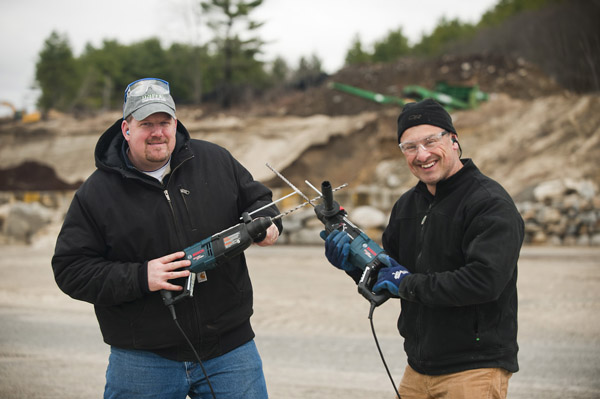 Bosch supplied our team with Bosch’s 3/8″ SDS-Plus Bulldog Xtreme Rotary Hammer Bits, DEWALT’s High Impact Carbide 3/8″ SDS-Plus Bits, and two new 1″ SDS-Plus BULLDOG Xtreme Rotary Hammer to control for the performance of the tool itself. With the bits and tools we headed to New Hampshire, the “Granite State”, and put these bits to the test on 10″ Reenforced Concrete Bridge Decks. This is the same location we conducted our 1-9/16″ SDS Rotary Hammer Head to Head.
Bosch supplied our team with Bosch’s 3/8″ SDS-Plus Bulldog Xtreme Rotary Hammer Bits, DEWALT’s High Impact Carbide 3/8″ SDS-Plus Bits, and two new 1″ SDS-Plus BULLDOG Xtreme Rotary Hammer to control for the performance of the tool itself. With the bits and tools we headed to New Hampshire, the “Granite State”, and put these bits to the test on 10″ Reenforced Concrete Bridge Decks. This is the same location we conducted our 1-9/16″ SDS Rotary Hammer Head to Head.
Before we get into the methodology and results of this SDS-Plus Rotary Hammer Drill Bit Comparison – Bosch vs DEWALT, let’s take a good look at each bit and it’s advertised specifications and features to see how the accessories compare on paper.
SDS-Plus Bit Comparison
Bosch 3/8 In. x 12 In. SDS-Plus Bulldog Xtreme Rotary Hammer Bit Specifications
- SKU: HCFC2064
- Diameter: 3/8″
- Usable Length: 10″
- Overall Length: 12″
- Average Price: $16.42
[Price based on a compilation of online retailers – See table below]
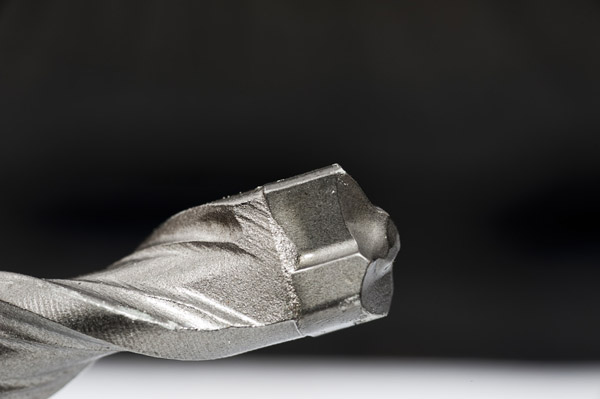 Bosch HCFC2064 SDS Plus Xtreme Rotary Hammer Bit
Bosch HCFC2064 SDS Plus Xtreme Rotary Hammer Bit
Features
- Diffusion bonding technology provides stronger carbide bond for the longest-lasting bit
- 4X life in all concrete types and concrete with rebar
- Wear mark assures hole diameter tolerance for anchoring applications
- Centric conical tip results in precise hole diameters
DEWALT 3/8″ x 10″ x 12″ High Impact Carbide SDS+ Bit Specifications
- SKU: DW55300
- Diameter: 3/8″
- Usable Length: 10″
- Overall Length: 12″
- Average Price: $17.62
[Price based on a compilation of online retailers – See table below]
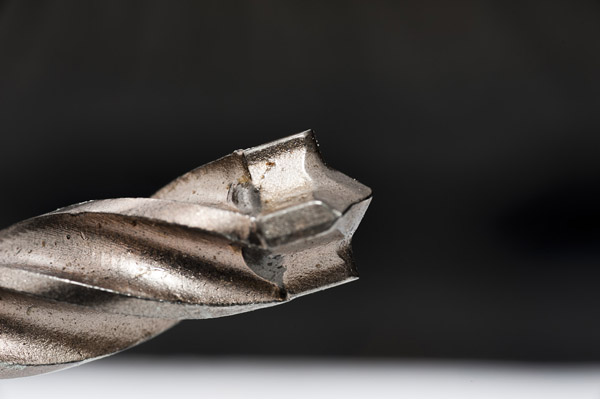 DEWALT DW55300 High Impact Carbide SDS+ Bit
DEWALT DW55300 High Impact Carbide SDS+ Bit
Features
- 2X More Carbide for Long Life
- Four flute design cleans debris out for fast, efficient drilling
- Innovative Bonding System delivers extreme durability
First Impression
As you can see from the specs and features these bits compared side by side in a box store or on a online retail website appear for all intensive purposes to be VERY similar. Picture yourself in the aisle of your local lumber yard holding these two bits, trying to compare the two based on advertisements on the packaging. The only vague discriminator you get is a comparable price difference and advertised bit life. Bosch claims a 4X increased life, while DEWALT advertises 2X more carbide for longer life, again although these claims are vague we assume they would lead the consumer to favor the Bosch accessory.
Another first impression we get is the price of an accessory, which can sway our purchases depending on the difference in cost. In this case it appears the price difference between these two accessories my not be enough to change your purchasing behavior.
Bosch HCFC2064 Prices
- Amazon: $14.34
- Home Depot: $17.97
- Grainger: $17.03
- White Cap: $17.89
- AceTool: $11.24
- Average: $16.42
DEWALT DW55300 Prices
- Amazon: $17.40
- Grainger: $25.65
- Acme Tool: $17.99
- Lowes: $17.48
- Factory Authorized Dealer: $12.99
- Average: $17.62
[Average Price excludes outliers at high and low price points of retailers listed]
Bottom line, it’s difficult to choose the right accessory without the right information, this is where we come in, to provide some clarity in these vague claims of 2X, 3X, and 4X benefits. So sit back and trust the pros!
Head to Head Testing – Speed & Endurance
For this test we not only compared the overall life of the bits but also integrated the sustained speed of the bits to further analyze the increased or saved productivity using a “better” bit. We determined a speed baseline for each bit drilling a 6″ hole with a healthy sample size. We then took that baseline and had each bit tested drilling 6″ holes until the average time to drill a hole was double the baseline speed. This test was to simulate the point at which a bits performance leads the operator to change to a fresh, more productive bit. 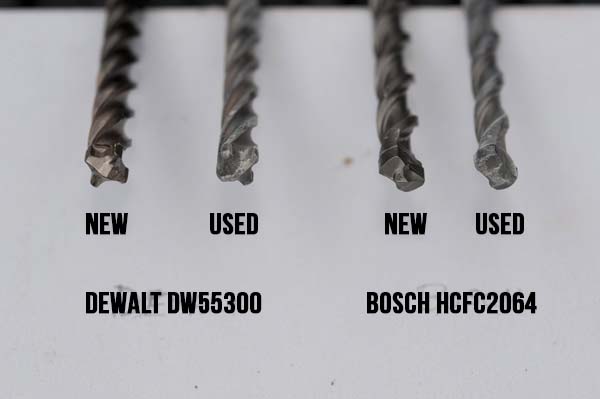
SDS-Plus Rotary Hammer Drill Bit Comparison Results
| Bit Tested | Baseline | Time at “Failure” | Avg. # of Holes | Avg Price | Avg. Price/Hole |
| Bosch HCFC2064 | 14 sec. | 28 sec. | 550 | $16.42 | $0.03 |
| DEWALT DW55300 | 20 sec. | 40 sec. | 300 | $17.62 | $0.06 |
The Bosch SDS-Plus Bulldog Xtreme Rotary Hammer Bit averaged 14 seconds for a 6″ hole, approximately 30% faster than the DEWALT High Impact Carbide SDS+ Bit which averaged 20 seconds for our baseline test. These two baseline times were used to set the criteria for “failure” (the point at which we feel a user may choose to switch to a new drill bit for better performance).
With this baseline threshold for “failure” the Bosch bit drilled approximately 80% more holes (550 holes compared to 300) before it reached our failure point. Even more impressive the Bosch baseline was significantly faster than the DEWALT so that at “failure” the Bosch bit was performing only 25% slower than the DEWALT at peak performance.
SDS-Plus Rotary Hammer Drill Bit Comparison Video
SDS-Plus Rotary Hammer Drill Bit Comparison Results Summary
- Bosch HCFC2064 30% FASTER than DEWALT (with new bits)
- Bosch HCFC2064 drilled 80% more holes than DEWALT (using our criteria)
- Bosch HCFC2064 at “failure” was only 25% slower than DEWALT at Baseline Speed
- Bosch HCFC2064 average price per hole 50% less than DEWALT
Conclusion
Bottom line, our results point to the Bosch SDS-Plus Bulldog Xtreme Rotary Hammer Bit being a faster, longer lasting, and a more productive bit. The Bosch bit almost doubled the number of holes drilled by the DEWALT bit and furthermore the increased speed of the Bosch bit means your work is getting done 30% faster. That equates to simple job site math: less bit changes, less trips to the tool box for more bits, less trips back and forth to the store to purchase more bits and ultimately more time on task.
As a contractor and business owner I know that research has shown that only 33% of our time on the job site is productive. The rest of that time is spent on tasks such as material runs, unplanned demands, interruptions, searching for tools, searching for parts, accessories and running errands. Purchasing an accessory that lasts longer just makes sense, and the Bosch SDS-Plus Bulldog Xtreme Rotary Hammer Bit performed longer and faster in this comparative testing.
Note: The results of this test are not indicative of all Bosch or DEWALT drill bits or accessories, but rather are just specifically focused on these two SKUs and the tests we performed. While Bosch did supply all the bits and drills for this testing, we determined the actual tests, criteria, and opinions presented in this article.
About the author
9 Comments
Leave a comment
Disclosure
Product reviews on this site contain our opinion of a product or service. We will always strive for objectivity and transparency in our reviews. Our goal is to provide readers with honest, objective information based on our own experiences. We never have and never will accept payment in exchange for a positive review. Many of the products that we review are provided to us for free by a manufacturer or retailer. In some cases, we also have advertising or affiliate relationships with manufacturers and retailers of products and services we review. For additional information please visit our additional disclosure policies.


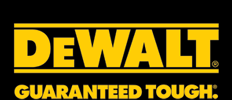








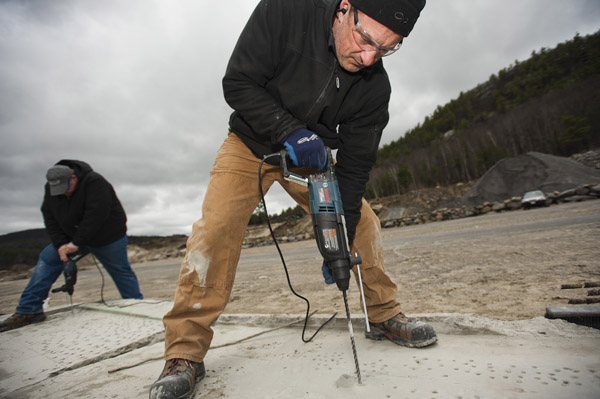
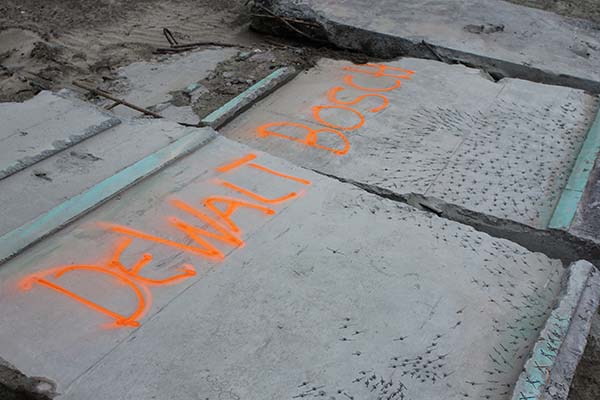

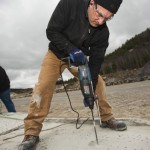
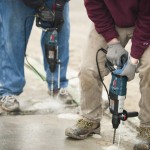
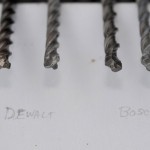
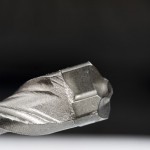

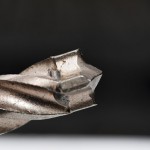
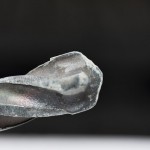
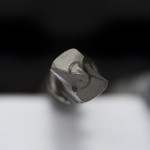
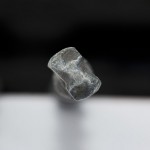
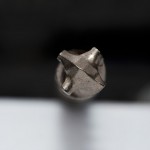
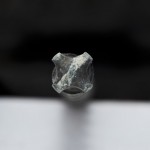












[…] Bosch asked us to test their 3/8″ SDS-Plus Hammer Drill Bit against a comparable DEWALT bit (read the full article here). This year they asked us to round out the comparison by looking at an additional bit from […]
You came to NH because it’s the granite state and proceeded to test bits on concrete?
I came to this site to find out what bit is better for drilling granite.
We both failed.
I’m using a DEWALT DCH273B cordless rotorhammer in what I believe to be hard quartz granite.
Drilling 3/8″ dia about 4″ deep.
The bit is completely smoked in less than 2 holes. Brand new carbide tipped bits. Smoked 2 bits and couldn’t finish the 5th hole. They just stop drilling.
I double checked, yes, using the rotor hammer setting, and going the correct direction. Drills deep and quick w/ new bit, but very quickly slows down.
The bits are extremely hot even after short bursts of drilling. The steel under the tips come out blue after second hole.
Obviously I’m doing something wrong if your bits are lasting 200 times longer w/ a heavier corded drill and drilling even deeper.
Should I be water cooling? (I’m drilling mostly horizontal, Don’t really want extra moisture in the hole, difficult to do as well.)
Should I quenching the bit every so often?
I can’t seem to find anyone making diamond tipped bits instead of just carbide.
Am I pressing too hard? I don’t feel like I’m pressing that hard, maybe 10lbs?
My googling skills aren’t coming up w/ any obvious solutions.
Jason – There’s a big difference between drilling in concrete and drilling in straight rock. First thing is I’d look at some different bits, what brand are you using?
I will tell you what you are doing wrong in this case of smoking bits after a couple holes. You are not using a real Rotary hammer! Cordless tools have come a long way in recent years and the top name brand units are quite impressive BUT where there is the convenience of cordless there is the shortage of working performance that you get from having that cord plugged into the wall. It is like buying a computer. A laptop is not going to have the processing power and performance of a full size desktop. The tool you are using is not providing the hammer impacts(jouls) you need and friction is smoking you’re bits. Get a real Roto Hammer and if you are able, get a Bosch and Bosch bits. They made this tool and all the others should have stayed in school.
Not entirely sure your comparison is that accurate. In all honesty, the specs are nearly identical.
I wanted to buy the best bits to drill into granite rocks, the bits that would drill more holes and have the longest life. can you recommend a brand with the specific model part or number
Chris – Any carbide tipped rotary hammer bit will drill granite.
Chris,
I have been drilling 3/4″ holes in granite with a rotary hammer for three years. I use the SDS max Milwaukee or bosch carbide tipped bits. The bits are expensive at most box stores, averaging around $46.00. I am using feathers and wedges to split and then shaping the stones into squares and rectangles with carbide-tipped tools(Trow and Holden- great tools). I am lucky if I can get the cost of the holes down to about $1.28 per hole. I am drilling dry with a corded drill. Make sure you go slow and let the drill do most of the work and your bits will last longer. If drilling a lot of holes I switch bits out, for me, it seems to get a few more holes. When the bits start for a break, you can usually tell, start a new hole, and you might get a few more, just don’t keep drilling with broken carbide cutter in there.